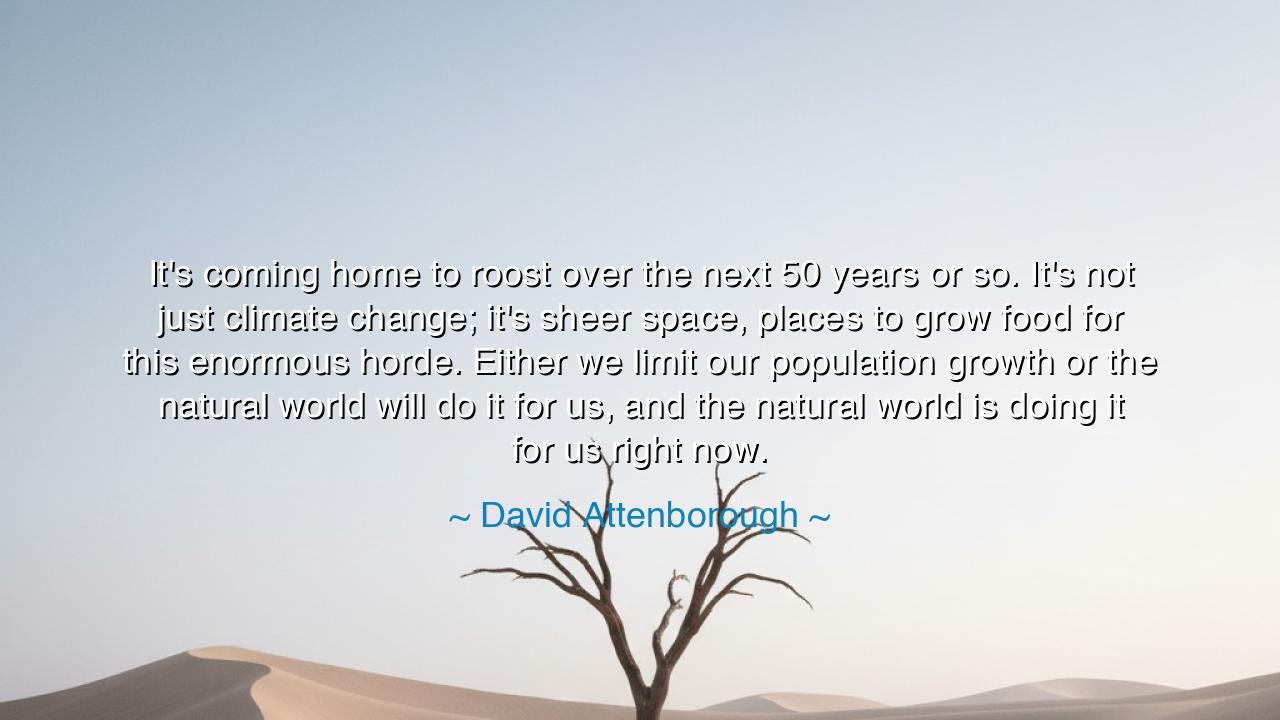
It's coming home to roost over the next 50 years or so. It's not
It's coming home to roost over the next 50 years or so. It's not just climate change; it's sheer space, places to grow food for this enormous horde. Either we limit our population growth or the natural world will do it for us, and the natural world is doing it for us right now.






Hear the elder naturalist speak with the gravity of tides: “It’s coming home to roost over the next 50 years or so. It’s not just climate change; it’s sheer space, places to grow food for this enormous horde. Either we limit our population growth or the natural world will do it for us, and the natural world is doing it for us right now.” In this warning, David Attenborough gathers many threads into one stern cord. He tells us that consequences travel on slow feet, but they do arrive; that the bill for borrowed land, borrowed water, borrowed sky, will be presented within a human lifetime. He names three unforgiving ledgers—people, space, and climate—and says they balance themselves whether or not we help.
Consider the phrase coming home to roost. It is the image of birds returning at dusk to the very rafters from which they flew at dawn. So do our choices circle back: forests felled upstream become floods downstream; aquifers drained become harvests that fail; heat trapped today becomes hunger tomorrow. Attenborough’s clock—50 years—is not a prophecy of a single day, but of a long reckoning in which many small margins erode into one great shortage. The point is not panic; the point is arithmetic with compassion.
He insists it is “not just climate change,” and the insistence is wisdom. A cooler planet would still need space for fields, rivers to lift irrigation, soil kept alive by root and microbe. Food is matter plus time plus place; when any of the three fail, people move or people starve. In crowded deltas where salt fingers creep inland, in cities that sprawl over once-black loam, in plains stripped to dust by hurry and heat, the same lesson repeats: there are limits, and pretending otherwise is a cruel optimism.
History has already murmured the verdict. In the Sahel of the 1970s and 1980s, rapid growth pressed against grazing lands as rains faltered; famine followed, and with it migration and conflict. The Aral Sea, fattened for cotton by diverted rivers, withered into poisoned flats—local climate shifted, livelihoods collapsed, and a once-inland ocean became a cautionary parable writ in salt. These are not ancient myths; they are modern receipts. Each shows what happens when the horde grows while the space to feed it shrinks and the natural world—soil, water, wind—answers in its own unsparing grammar.
Attenborough’s sentence is hard where it must be: either we limit our population growth or the natural world will do it for us. The natural world does not negotiate; it balances. It balances through failed rains, failed crops, failed bodies; through storms that erase boundaries and diseases that find overcrowded hosts. To leave the balancing to nature is to choose suffering as policy. To balance with foresight is to choose dignity: to steady births by education, health care, and rights; to steady demand by efficiency and fairness; to steady supply by healing land rather than strip-mining it.
The deeper meaning of the quote is stewardship married to restraint. Growth has given gifts—medicine, literacy, light—but ungoverned growth becomes a fire that eats its own house. The aim is not to fear people, but to honor carrying capacity; not to worship austerity, but to praise sufficiency. When we keep space for wetlands and corridors, when we plan cities up instead of out, when we raise yields without killing soils, we make room for both meadowlark and market, both child and cedar.
Let the lesson be clear as noon: mercy now, or mathematics later. Actions worthy of the hour: (1) Educate girls and empower women, expanding access to voluntary family planning—the most humane brake on population pressure. (2) Fix food: halve waste from field to fridge; shift diets toward lower-impact proteins; invest in agroecology and soil restoration so food rises without exhausting land. (3) Build for density and dignity: transit, housing, green roofs and trees—cities that use less space and energy per person. (4) Price truth: end perverse subsidies that reward overuse of water and fossil fuels; let prices reflect real costs and return revenue to households fairly. (5) Protect and reconnect nature: reserves, mangroves, pollinator strips, wildlife corridors—living infrastructure that pays compound interest in resilience. (6) Cut heat at the root: electrify, decarbonize, and store clean power so climate change stops sharpening every other limit.
If we do these things with steadiness and courage, the birds that come home to roost will be swallows under eaves, not harpies at the gate. If we do not, the natural world will keep its books without us. Choose the kinder ledger while there is time, and let the century ahead remember us not for our numbers, but for our wisdom.






AAdministratorAdministrator
Welcome, honored guests. Please leave a comment, we will respond soon